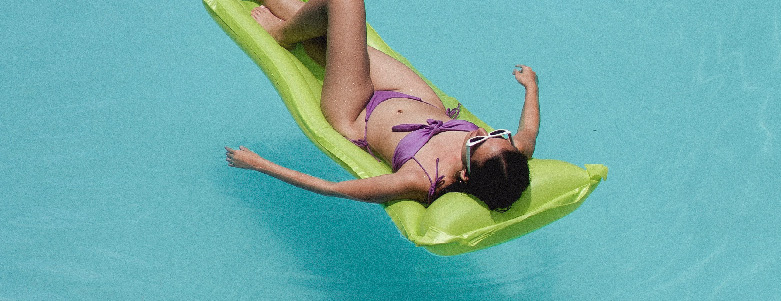A Beginner's Guidebook to Pool Maintenance
A swimming pool in the backyard is a dream come true for many homeowners. It adds beauty to your backyard, helps in maintaining a good fitness routine, and provides a good place to relax with your family. One of the most important elements that homeowners have to keep in mind before buying a pool is its maintenance. Proper and regular maintenance is necessary for a swimming pool to stay in good shape and increase its lifespan.
To design a good pool maintenance strategy, it is crucial to have a thorough understanding of the workings of the pool, common issues, and methods to resolve them. This beginner’s guide will help you with all the steps of pool maintenance.

Know Your Pool
It is crucial to have good knowledge about all the components of your swimming pool before you can use or maintain it effectively. When you are aware of the main components of your swimming pool and how they work, it becomes easier to deal with problems when they arise.
Components Of Your Swimming Pool
Swimming pools mainly have four components in need of regular maintenance. These components include:
Swimming Pool Water
Pool water is the main component of your swimming pool. To have fun and healthy swimming, it is necessary to keep the water clear, clean, and balanced. The water should not have any pollutants or contaminants. This can negatively affect the health of the swimmers, causing infections and allergies. Unbalanced chemical levels in the water can cause mineral depositions and corrosion, resulting in costly repairs and shorter pool life.
Filter System
The pool filter is an important part of your swimming pool. The pool pump, along with the help of filters, is responsible for keeping the pool clean. The filter removes dirt, debris, and other pollutants from the pool water. A malfunctioning pool filter can cause your pool water to become polluted, cloudy, and unswimmable. There are numerous types of filters, like sand filters, diatomaceous earth filters, and cartridge filters. Saltwater pools have saltwater chlorinators.
Interior Of The Pool
Your swimming pool walls are constantly in contact with your pool water and anything else in it. This can cause the build-up of algae, debris, and mould on the pool walls, leading to damage and cracks. Properly cleaning and maintaining the walls will help you keep the pool safe and clean.
Skimmers And Returns
The water is pulled into the pool filter for cleaning by the pool skimmers. The clean water is then pushed back into the swimming pool by the pool returns. These two components need to be free of dirt and debris to function efficiently.
No two swimming pools are similar. This means that every pool owner may encounter issues that are unique to their pools. But if you have a basic understanding of the various pool components, it is easier to solve any issues regarding pool maintenance.

Appropriate Pool Maintenance - The Three Critical C's
Circulation, chemistry, and cleaning are the three basic yet crucial ideas serving as the cornerstone of effective pool maintenance.
Pool Water Circulation
Constant and proper water circulation is necessary to keep your pool safe and healthy for swimming. If the water in your swimming pool is moving, it will be clearer, cleaner, and safer. With proper circulation, you can minimise issues like algae infestation and cloudy water. You should keep your pool filter and pump constantly running to achieve this.
Running the pool pump 24/7 is good for your swimming pool but may not be economical for everyone. In such cases, it is ideal to run the pump for at least eight hours every day. Backwashing is also a crucial component of ensuring good circulation. In this method, the water flows in the opposite direction than it normally does, helping to flush up built-up debris. It also helps to wash those places that are not cleaned when the filter basket is emptied.
Cleaning Schedule
It is very easy to clean a pool that already has good circulation. You just need to follow a basic cleaning routine to keep your pool clean and shining. Cleaning is also important to avoid health-related issues. Fallen leaves and pollen clumps can be easily removed by using a net skimmer. You can also use pool vacuums to clean fallen leaves, algae deposits, and any other debris from the pool surface. Make use of a pool brush to clean the walls and tile of the pool. You can use the brush in those sections of the pool that cannot be easily reached. Remember to properly clean the stairs, corners, waterline, and crevices. You can also use automatic pool cleaners if you have a tight schedule.
Pool Water Chemistry
Maintaining a consistent chemical level in the pool is important to have a safe and healthy pool. The most important factors to consider are pH levels, alkalinity, and sanitiser levels. The pH level should be maintained, preferably between 7.4 and 7.6. The ideal alkalinity range is about 100 to 150 ppm. Similarly, optimal amounts of chemicals like chlorine and bromine should be added to the pool.
Along with using the requisite pool chemicals, it is also important to shock the pool whenever necessary. The pool should be shocked at least twice every season or whenever the water starts to appear cloudy. It is also important to do shocking the right way since it is easy to over chlorinate water and cause damage to the pool and the people swimming in it. You should also do this during the night to avoid the UV rays of the sun.

In Conclusion
To achieve proper pool maintenance, it is important to have a good maintenance schedule. Create a schedule or to-do list and follow it. Having an organised list will help you identify any important tasks that may have slipped your mind. It will also help you plan certain crucial maintenance tasks ahead of time.
It is also important to seek professional help at least once a year to check the overall state of the pool and conduct minor repairs, if necessary. This will help in the long run by preventing major damage and repair costs.






